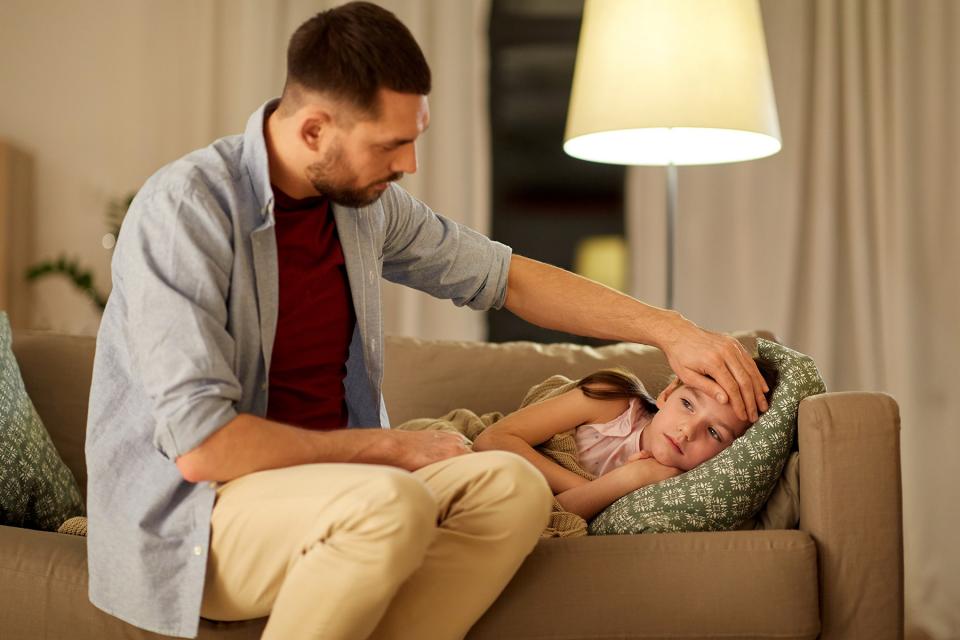How to Handle Co-Parenting When Your Child is Sick
It’s that time of year—the dreaded season of sickness. Between worrying about your kid, stressing about missed school days, needing backup childcare, and catching the sickness yourself, it’s a lot to manage. Add in co-parenting, and it can be a real headache.
The best plan is to have a plan. How will you and your co-parent make decisions when your child gets sick? The better prepared you are, the less stressful it will be for everyone, including your child.

When my child is sick, should we stick to the parenting time schedule?
As much as you can, try to stick to your parenting plan. If you have doubts or you disagree about how to handle the situation, then you may want to speak to your attorney or parenting coordinator.
When needed, tailor your decisions to your child’s condition and preferences. If your child feels or seems too sick to make a transition, you can adjust the parenting calendar to reflect their need or desire to stay. If you’re using the OurFamilyWizard Calendar, you can use a simple schedule change request form.
If your child just has a moderate cold, on the other hand, or simply wants to switch houses on schedule, then it’s usually a good idea to let them—normalcy and routine can be helpful for coping and for recovery. Do what you can to make the transition easy and gentle.
Of course, use your best judgment: If you feel your child is so sick that they shouldn’t have to make an adjustment, see if you can keep them at your house or let them stay at their other parent’s.
What if my co-parent treats sickness differently than I do?
It’s confusing for kids when one parent tells them to rest and watch TV, while the other parent tells them to be tough and keep moving. If possible, coordinate care and treatment. You may need to both compromise a little. This makes transitioning between houses easier for your child.

What if I miss my sick kid when they stay longer at their other parent’s?
If your child is with your co-parent when they fall sick, and they’re too sick to move, that doesn’t mean you can’t see them until they’re feeling better. Ask your co-parent if you could drop by and read your child a book, sing to them while they fall asleep, or bring them a tempting meal.
If your child is very contagious or you can’t visit in person, consider a phone call or video call. Through OurFamilyWizard’s Calls feature, all calls are documented so you have a clear record of communication.
Who decides if the kid stays home from school?
The residential parent—whoever the child is living with at the time—usually decides whether the child should go to school or stay home, as this would typically be considered a day-to-day parenting decision rather than a major decision.
Double check your parenting plan to see whether it addresses who would make this kind of decision. If your co-parent gets to decide and you disagree with their decision, there’s probably not a lot you can do about it—but if you have larger concerns or it becomes a pattern, speak to a family law professional.
What if I prefer that my sick child stays with my co-parent? I don’t want to get sick.
If you have other kids at home or you have a big presentation coming up, it might be tempting to keep the germs out of your home. But keep in mind that by the time your child shows symptoms, you may have already been exposed. Sick kids need hugs, attention, and affection. Of course, if your child has a serious and contagious illness, you may need to be more careful.
If your child needs to come home with you despite your worries, you can take steps ahead of time to prep your home for their return. Stock your child’s bedroom with supplies so they don’t have to wander the house and ask your other kids not to hug or cuddle with them.
How do we keep track of medical info between two houses?
If you’re using OurFamilyWizard, you can use the Info Bank to keep track of doctors, specialists, hospitals, medications, allergies, and more. Different sections in the “health” category keep everything organized and easy to find. If your co-parent has a question about follow-up care after you take your child to the pediatric ER, it will be easy for them to find the right doctor’s phone number.
The Info Bank even lets you track when you last administered medication. That can help you and your co-parent stay on track and not miss a dosage or give too much.
Make sure you include your health insurance plan information in the Info Bank, so you and your co-parent can make smart financial decisions by choosing covered doctors. You can also use the Expenses feature to split medical costs based on the split outlined in your parenting plan.

What if I don’t trust my co-parent to take good care of my sick kid?
This issue—a lack of trust in your co-parent’s ability to care for your child—is upsetting whether the child is sick or not. But it can feel more urgent in these situations. At the end of the day, though, your co-parent is your child’s parent. If you can’t control something, let it go (within reason). If it’s a bigger concern or the situation gets intense, talk to a professional.
Take amazing care of your child while they’re with you, and when it’s not your time, remind yourself that there are many, many different parenting philosophies and different ways of parenting—and, for the most part, kids are adaptable and resilient.
What if my child complains about the care they receive from my co-parent?
If your child comes to you with a concern, talk them through letting it go, if appropriate. But if it needs to be addressed, message your co-parent through a co-parenting tool that keeps it well documented. Use a calm, matter-of-fact tone so your co-parent doesn’t feel attacked. Be specific, not vague or generalizing.
The OurFamilyWizard Messages feature stores all messages permanently, and it’s easy to create a PDF report. If your concerns progress and the situation is serious, you’ll have these communication records to share with your family law professional.
How can I help my sick child feel less stress?
One huge thing you can do is stay positive about your co-parent in front of your child to the greatest extent possible. Kids pick up on tension between their parents, and it can increase their stress. So try to present a united front, even if that front is an agreement to do things differently.
You can’t stop the common cold, but you can care for your child
Co-parenting a sick kid is tricky, but keeping the lines of communication open and following a plan can help smooth the process.




